Five years after forming, agency leaders with the Sequim Health and Housing Collaborative (SHHC) continue to seek the best options to support community members, while unifying the many methods used to help those struggling with physical health, behavioral health, sheltering, substance use and food insecurity.
Strengthening partnerships was one of the core themes behind SHHC’s May 31 summit that hosted 66 stakeholders from Sequim area churches, nonprofits, local municipalities and others at the Guy Cole Event Center.
“What can we do? Being here is a good start,” said Andra Smith, executive director of the Sequim Food Bank.
She and others spent about five hours discussing what’s working well, needs improvement, and missing for local health and housing services.
To expand on the pithy conversation, SHHC leaders will discuss their takeaways from the summit at the WOW! forum presentation “The Power of Collaboration in Sequim” at 2 p.m. Wednesday, June 14 on KSQM 91.5 FM.
Sara Nicholls, executive director of the Sequim Free Clinic, said the summit could help provide a potential direction for need over the next three-five years and see how the City of Sequim and other agencies can help.
A summit report will tentatively be available at the end of June summarizing how local needs changed, and how stakeholders might plan to adjust, she said.
History
Sequim’s city attorney Kristina Nelson-Gross said SHHC formed following the city restructuring its health and human service funding to a Request for Proposal (RFP) contract process for up to $75,000 to help address issues such as health, housing, food insecurity and substance use.
A summit was held in 2018 with 50 stakeholders and the city council later approved the RFP with nine agencies at the time.
City councilors approved an increase in SHHC’s contract last year to $100,000 for this year’s city budget.
“We have to have stakeholders work together,” Nelson-Gross said. “The goal was to think big, and put ourselves out of business.”
While COVID-19 led the collaborative to shift by adding safety provisions, stakeholders also increased outreach through food bank distribution days, adding a laundry service, lunches, street based outreach and much more, according to Sandra Allen, outreach services supervisor for Peninsula Behavioral Health.
She said SHHC’s Helping Our People Engage (HOPE) Team received additional funding to increase direct outreach and help connect people with services. It went from 832 people in 2020 to 1,447 in 2021, and to 3,398 in 2022.
From on the ground, stakeholders said there’s a plethora of need for housing/shelter support for an aging population, utilities/rent, family housing, emergency shelters, home repairs and more.
For healthcare, some of the items they reported were a need for substance use treatment, mental health services, primary care providers, dental care and eyeglasses.
Some support service needs include food, gas, shelter items, phone, pet food and income/employment.
Increase
“We have not seen a decrease in the need of services,” Smith said.
She added that during the pandemic, agencies received “tremendous support through Covid” and since then items have gone up in price causing a ripple effect on families.
“We’re up 42 percent from the same time last year in visits to the Food Bank,” Smith said.
“With food insecurity, this is a money thing. Families can’t make it work so we provide food so they can make it.”
Kathy Suta with Sequim Community Aid and other agency leaders at the summit confirmed they’ve seen a continued spike in requests for support, too.
Suta said there are many people in the community who are unaware “how big the need is for the elderly and children” for general support and she felt more awareness is key.
Sequim police chief Sheri Crain said there is an emergency fund through donations to the city for people who need one night in a hotel or gas to drive somewhere but it’s not meant to address long-term needs.
“Hotels are losing an appetite for that kind of service,” she said. “Even we wear out our welcome.”
Stakeholders have identified a long-term plan to create a physical space at the Sequim Food Bank for SHHC to serve as a hub for services, Smith said, and for now it’s being done organically.
Key takeaways
During the summit, participants spoke as a group and in smaller groups about issues. At the end of the event, each person received stickers to place on listed items that are needed most.
Some of the top priorities for participants included: the need for affordable housing, emergency shelters and transitional housing in Sequim, inpatient services, more primary care doctors, more childcare with livable wages, thriving wages in general, a centralized phone app for support services/ resources, and a need to reduce stigma for food accessibility.
Wendy Sisk, chief executive officer for Peninsula Behavioral Health, told fellow stakeholders there are huge gaps in funding for behavioral health.
“There’s no equity in healthcare,” she said. “We’re the one sector of healthcare that has to dig money out of the sofa.”
Sam Schroeder, youth services manager with OlyCAP, also emphasized that “folks struggling with (health and housing) issues are from here.”
For more on the SHHC, reach one of its main agencies — Peninsula Behavioral Health, Sequim Food Bank, Olympic Community Action Programs, Healthy Families of Clallam County, and/or Dungeness Valley Health and Wellness. Reach the Sequim Food Bank, 144 W. Alder St., at sequimfoodbank.org or 360-683-1205.



